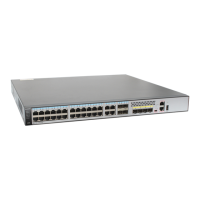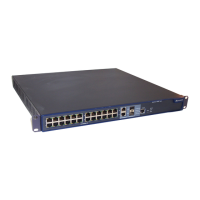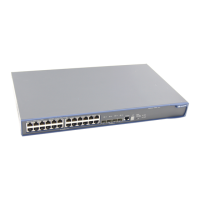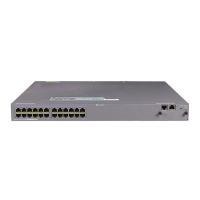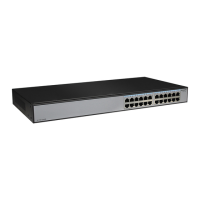Command Manual – QoS/ACL
Quidway S8500 Series Routing Switches Chapter 2 QoS Commands
Huawei Technologies Proprietary
2-38
traffic-priority inbound link-group { acl-number | acl-name } [ rule rule
[ system-index index ] ] { auto | remark-policed-service { trust-dscp | dscp
dscp-value | untrusted dscp dscp-value cos cos-value local-precedence
local-precedence drop-priority drop-level } }
undo traffic-priority inbound link-group { acl-number | acl-name } [ rule rule ]
View
Ethernet port view, VLAN view
Parameter
inbound: Sets traffic priority for inbounds packets at the port.
ip-group { acl-number | acl-name }: Activates IP ACLs, including basic and advanced
ACLs. acl-number: Sequence number of ACL, ranging from 2000 to 3999. acl-name:
Name of the ACL, which must be a character string starting with an English letter (a-z or
A-Z), and without any space or quotation mark in it.
link-group { acl-number | acl-name }: Activates Layer 2 ACLs. acl-number: Sequence
number of ACL, ranging from 4000 to 4999. acl-name: Name of ACL, which must be a
character string started with an English letter (a-z or A-Z), and without any space or
quotation mark in it.
rule rule: Specifies the subitem of an active ACL, ranging from 0 to 127; if not specified,
all subitems of ACL will be activated.
system-index index here is the system index for an ACL rule. When delivering a rule,
the system assigns a globally unique index to it, for convenience of later retrieval. You
can also assign a system index for it when delivering an ACL rule with this command.
However, you are not recommended to manually assign a system index if not urgently
necessary.
auto: Chooses the service parameters allocated automatically by the switch.
remark-policed-service: Reallocates service parameters.
trust-dscp: Reallocates service parameters according to packet DSCP values.
dscp dscp-value: Reallocates service parameters according to user’s DSCP values or
EXP values. For IP packets, dscp-value is the specified DSCP priority value (six bits in
the packet header) and in the range of 0 to 63; for MPLS packets, other than that the
dscp-value stands for their DSCP priority value, the three high-order bits of the value
represent the EXP flag field. Set the EXP value when defining the dscp-value.
untrusted dscp dscp-value cos cos-value local-precedence local-precedence
drop-priority drop-level: Customizes a set of service parameters. For IP packets,
dscp-value is the specified DSCP priority value (six bits in the packet header) and in the
range of 0 to 63; for MPLS packets, other than that the dscp-value stands for their
DSCP priority value, the three high-order bits of the value represent the EXP flag field.
Set the EXP value when defining the dscp-value; local-precedence is local precedence,

